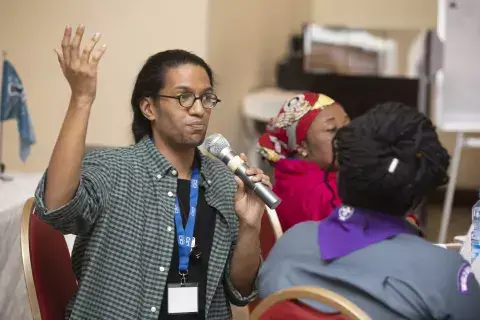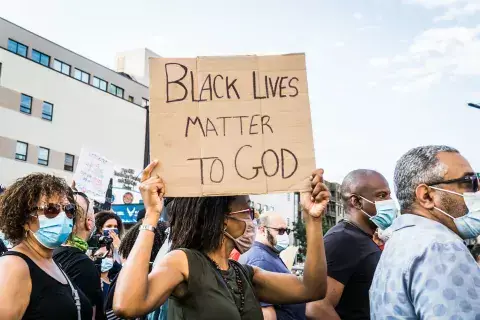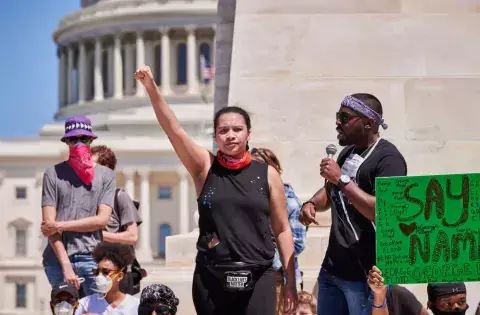
Social justice advocate Uzair Ben Ebrahim was a member of the Student Representative Council at the University of Cape Town when the “Rhodes Must Fall” protest made headlines across the world in 2015.
Now an English and religious studies teacher, the 28-year-old KAICIID Fellow recalls how he was among the South African youth who petitioned to have a statue of 19th century British colonialist Cecil Rhodes removed from their university campus.
The bronze sculpture, which had survived the fall of apartheid, was perceived by students as a symbol of white privilege and a reminder of South Africa’s divisive legacy of colonialism.
“Back then, it forced us to have that conversation again. That is not to say that we didn't have it before,” said Ben Ebrahim. “We did, but it wasn't at this level.”
In recent months, Ben Ebrahim has been closely following similar debates and unrest over systemic racism – this time in the United States.
“With the Black Lives Matter movement, when we talk about social justice and issues of minorities within certain contexts, this is an interesting thing for me to explore, because I find myself as a minority in my particular context as well,” he said.

Ben Ebrahim’s diverse heritage includes ancestors from Indonesia, Malaysia and India. He is also a part of a Muslim minority in his native South Africa.
“I question what it means for me to belong in a particular context, knowing that it’s my people who brought Islam to South Africa, and to be Muslim within a predominantly Christian society.”
Today, Ben Ebrahim is a member of several prominant interfaith organizations, including United Religions Initiative (URI), the Cape Town Interfaith Initiative and the Muslim Jewish Interfaith Coalition. He has used his interreligious networks to collaborate on racial justice and open up discussions on inequality.
Still, he admits, he often struggles to place the race debate on conference and meeting agendas. “You usually don’t see this kind of speech within religious or interfaith organizations and I think there is a motive behind it. A lot of religious or interreligious organizations are set up based on what I call the fluffy things: we want to have peace between us, we want to be kind, so we never talk about the issues or we try to move away from them,” he said.
Ben Ebrahim believes this hesitancy comes from a reluctance to address failure and a fear of exposing systemic racism within organizations, even if certain projects or actions were done with the best of intentions.
“You’re going to need to acknowledge that there are issues in your organization; that what you've been doing, even though you might think that it's the most amazing thing in this world, could potentially have been the most disastrous and the most traumatic thing to be done,” he said.
Difficult as it may be, that conversation, according to Ben Ebrahim, has become unavoidable as the socio-economic repercussions of COVID-19 worsen the already challenging conditions for minorities living under the poverty line.

“Recently, I was speaking to a friend of mine, who is a Christian, at an interfaith get together and we agreed that we needed to use religion as a tool to bring about justice. Because what's the point of being faithful when your neighbour has nothing?”
Tensions reached a boiling point in May last year, as the killing of George Floyd by a white police officer in the United States ignited public outrage around the world. For many, Floyd’s death marked the culmination of centuries of racial injustice at a time when COVID-19 was laying bare vast systemic inequalities and hitting black and minority communities at disproportionate rates.
The protests triggered civic unrest in America at a scale not seen since the 1968 assassination of Rev. Martin Luther King Jr., and forced many faith communities, particularly long-established Protestant churches, to grapple with their own complicated history with racism.
As the Black Lives Matter and other racial justice movements took to the streets to protest, four interfaith organizations, which included the Parliament of the World’s Religions, URI, Religions for Peace and the Interfaith Center of New York, released a statement titled, “Religious Leaders and Communities on the Crisis of Racial Injustice and Inequity.”
The document condemned “racial injustice, deep inequities, hate speech, brutality, and authoritarian power” used against African Americans at a time when “millions are infected and affected by a global virus.”
Signatories included representatives of the Baha’i, Buddhist, Christian, Hindu, Humanist, Indigenous, Jain, Jewish, Muslim, Sikh, Taoist, Unitarian Universalist and Zoroastrian traditions “We soberly own up to the fact that our religious communities have been complicit for far too long,” they wrote.
Audrey Kitagawa served as chair of the Parliament of the World’s Religions when the statement was released and was actively involved in its drafting.

“Oftentimes self-examination is a very difficult process to undergo because it assumes a willingness to come out of denial, as well as to be open to the possibility that there is a need to change in big and small ways,” she said.
Kitagawa adds that these changes often take real courage. “You may have to go against the grain of beliefs and adherence to actions that arise out of those beliefs, the entire history of enculturation and mindsets that are shaped by the context within which we find ourselves. That being said, I do believe that a process of real change has been commenced.”
Faith communities across the United States have joined suit. In June 2020, the Council of Bishops of the United Methodist Church launched the #End Racism campaign and called upon each and every church member to “join together to take a stand against the oppression and injustice that is killing persons of colour.”
In October 2020, the Minnesota Council of Churches, comprised of 25 member denominations and 1 million members, launched their own “truth and reparations” initative. The 10-year plan for racial healing openly acknowledges the church’s complicty in racism against African and Native Americans, and seeks to make amends through financial investments and long term programmes which will benefit minority communities.
This reckoning within faith communities has echoed changes on Capitol Hill where racial equity was listed as one of four key priorities for the Biden-Harris administration, which was inaugurated in January. Kamala Harris, herself, has made history as the first woman Vice President of the United States, as well as the first Vice President of black and south Asian descent.
“Regardless of whatever comments may have been made with respect to institutional and structural racism, I think the bottom line for most people is that their moral compass and conscience really becomes repulsed by this whole process of degrading others,” Kitagawa said.
“I think these are all very positive signs and that we, as people and spiritual moral beings, have conscience that our inner moral compass does guide us appropriately.”